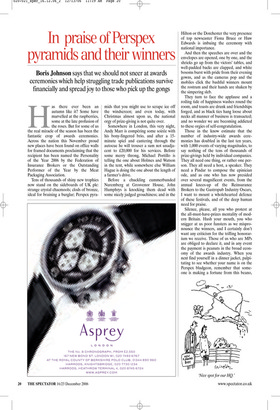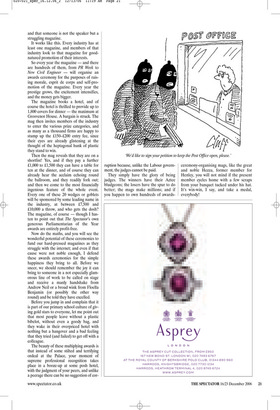In praise of Perspex pyramids and their winners
Boris Johnson says that we should not sneer at awards ceremonies which help struggling trade publications survive financially and spread joy to those who pick up the gongs Has there ever been an autumn like it? Some have marvelled at the raspberries, some at the late profusion of the roses. But for some of us the real miracle of the season has been the fantastic crop of awards ceremonies. Across the nation this November proud new places have been found on office walls for framed documents proclaiming that the recipient has been named the Personality of the Year 2006 by the Federation of Insurance Brokers or the Outstanding Performer of the Year by the Meat Packaging Association.
Tens of thousands of shiny new trophies now stand on the sideboards of UK plc: strange crystal chacmools; clods of bronze, ideal for braining a burglar; Perspex pyra mids that you might use to scrape ice off the windscreen; and even today, with Christmas almost upon us, the national orgy of prize-giving is not quite over.
Somewhere in London, this very night, Andy Marr is compèring some soirée with his bony-fingered brio, and after a 15minute spiel and cantering through the autocue he will trouser a sum not unadjacent to £20,000 for his services. Before some merry throng, Michael Portillo is telling the one about Holmes and Watson in the tent, while somewhere else William Hague is doing the one about the length of a farmer’s drive.
Before a chuckling cummerbunded Nuremberg at Grosvenor House, John Humphrys is knocking them dead with some nicely judged grouchiness; and in the Hilton or the Dorchester the very presence of top newscaster Fiona Bruce or Huw Edwards is imbuing the ceremony with national importance.
And then the speeches are over and the envelopes are opened, one by one, and the shrieks go up from the victors’ tables, and well-padded backs are clapped, and white bosoms burst with pride from their evening gowns, and as the cameras pop and the mobiles click the bashful winners mount the rostrum and their hands are shaken by the simpering sleb.
They turn to face the applause and a roiling tide of happiness washes round the room, and toasts are drunk and friendships forged, and as black ties hang loose about necks all manner of business is transacted; and no wonder we are becoming addicted to these orgies of self-congratulation.
Those in the know estimate that the number of industry-wide awards ceremonies has doubled in the last ten years, with 1,000 events of varying magnitudes, to say nothing of the tens of thousands of prize-givings held by individual companies. They all need one thing, or rather one person. They all need a host, a speaker. They need a Pindar to compose the epinician ode, and as one who has now presided over several magnificent events, from the annual knees-up of the Reinsurance Brokers to the Gastropub Industry Oscars, I want to mount a wholehearted defence of these festivals, and of the deep human need for praise.
Silence, please, all you who protest at the all-must-have-prizes mentality of modern Britain. Hush your mouth, you who snigger at us poor funsters as we mispronounce the winners, and I certainly don’t want any criticism for the trifling honorarium we receive. Those of us who are MPs are obliged to declare it, and in any event the payment is peanuts in the broad economy of the awards industry. When you next find yourself in a dinner jacket, palpitating to see whether your name is on the Perspex bludgeon, remember that someone is making a fortune from this beano, and that someone is not the speaker but a struggling magazine.
It works like this. Every industry has at least one magazine, and members of that industry look to that magazine for goodnatured promotion of their interests.
So every year the magazine — and there are hundreds of them, from PR Week to New Civil Engineer — will organise an awards ceremony for the purposes of raising morale, esprit de corps and self-promotion of the magazine. Every year the prestige grows, the excitement intensifies, and the money gets bigger.
The magazine books a hotel, and of course the hotel is thrilled to provide up to 1,800 covers for dinner — the maximum at Grosvenor House. A bargain is struck. The mag then invites members of the industry to enter the various prize categories, and as many as a thousand firms are happy to stump up the £150–£200 entry fee, since their eyes are already glistening at the thought of the heptagonal hunk of plastic they stand to win.
Then the mag reveals that they are on a shortlist! Yes, and if they pay a further £1,000 to £1,500 they can have a table for ten at the dinner, and of course they can already hear the acclaim echoing round the ballroom, and they readily fork out; and then we come to the most financially ingenious feature of the whole event. Every one of these 20 wedges or goblets will be sponsored by some leading name in the industry, at between £7,500 and £10,000 a throw, and who gets the dosh? The magazine, of course — though I hasten to point out that The Spectator’s own generous Parliamentarian of the Year awards are entirely profit-free.
Now do the maths, and you will see the wonderful potential of these ceremonies to fund our hard-pressed magazines as they struggle with the internet; and even if that cause were not noble enough, I defend these awards ceremonies for the simple happiness they bring to all. Before we sneer, we should remember the joy it can bring to someone in a not especially glamorous line of work to be called on stage and receive a manly handshake from Andrew Neil or a broad wink from Floella Benjamin (or possibly the other way round) and be told they have excelled.
Before you jump in and complain that it is part of our primary school culture of giving gold stars to everyone, let me point out that most people leave without a plastic bibelot, without even a goody bag, and they wake in their overpriced hotel with nothing but a hangover and a bad feeling that they tried (and failed) to get off with a colleague.
The beauty of these multiplying awards is that instead of some stilted and terrifying ordeal at the Palace, your moment of supreme professional recognition takes place in a booze-up at some posh hotel, with the judgment of your peers, and unlike a peerage there can be no suggestion of cor ruption because, unlike the Labour government, the judges cannot be paid.
They simply have the glory of being judges. The winners have their Aztec bludgeons; the losers have the spur to do better; the mags make millions; and if you happen to own hundreds of awards ceremony-organising mags, like the great and noble Hezza, former member for Henley, you will not mind if the present member cycles home with a few scraps from your banquet tucked under his hat. It’s win-win, I say, and take a medal, everybody!







































































































































 Previous page
Previous page